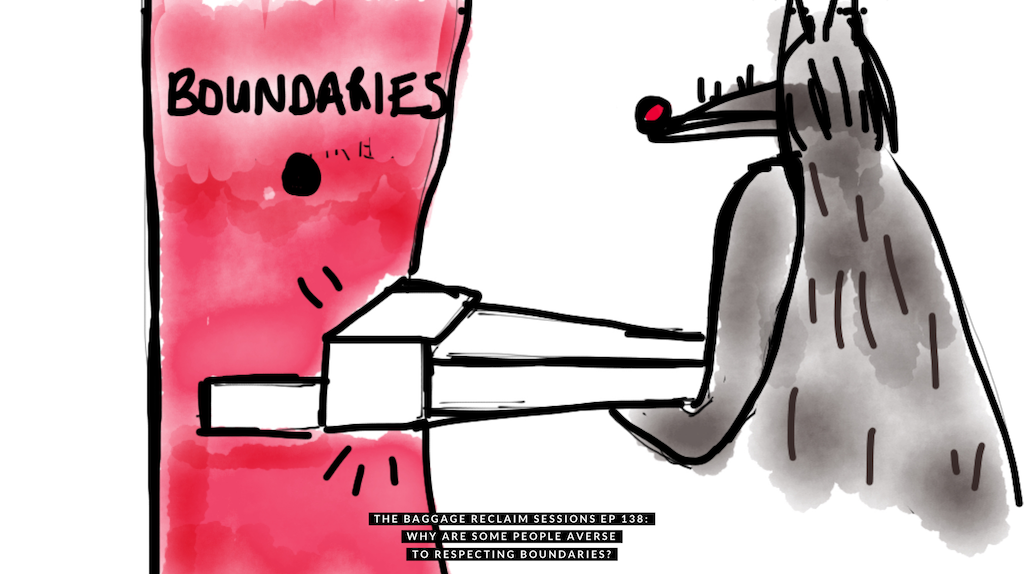In an ‘ideal world’, everybody would behave themselves, as well as have no baggage, no issues, no anything that gets in the way of having boundaries. But that’s not how life works. What we tend to do in response to someone’s aversion to having healthy boundaries is blame ourselves or assume that their specific intention is to make our life a misery. In reality, there’s something altogether different going on behind the scenes, and in this week’s episode of The Baggage Reclaim Sessions, I explain the eight key drivers of boundary-resistant people. I also delve into why it’s not just us that they have a boundary issue with, even though we often want to convince ourselves that everyone else is getting a much better deal.
Subscribe on Apple Podcasts | Spotify | Android
Some nuggets from the episode:
Why some people don’t respect other people’s boundaries
- Habit. They don’t know the line (boundaries) because they don’t (or rarely) experience natural consequences. In turn, they’ve convinced themselves that they’re hunky-dory. On some level, they think What I’m doing is fine. And even if it’s not, I’m not really experiencing any major negative consequences. My peers aren’t ostracising me. There’s little negativity from my family. I still get laid. I’m still getting to be in a relationship, and I’m still earning money.
- Power. For some, respecting other people’s boundaries equates to being taken advantage of. They construe it as somebody having something over them. They also have an eat-or-be-eaten mentality. You’re not the boss of me. No one says no to me!
- Control. They don’t trust that they can have their needs, expectations, desires, feelings and opinions acknowledged without obliging people through guilt, coercion or outright force.
- Some people create an atmosphere of guilt, effectively controlling the temperature of the household or relationship. It primes the people around them in advance to acquiesce to their needs, expectations, desires, feelings and opinions.
Our relationships need intimacy. And we can’t have intimacy without trust. And without trust, we can’t have healthy boundaries.
- Boundaries create vulnerability because we have to see people. We have to hear them. We have to consider another person’s position – empathy.
- Rebellion. Somebody who doesn’t respect boundaries is often rebelling against an old authority figure. They mistake this authority as the epitome of boundaries and so have decided that they’ve had too many boundaries in the past and will not be kowtowing to anyone again. I’ll get you back, mom/dad/teacher!
- To feel worthy. They feel more noticed, valid or ‘seen’ when they’re overriding other people’s boundaries as well as their own. They treat all attention equally. It’s as if they cannot be sure that they’d have a spot in your life if they ‘just’ behaved decently. If I respect his/her boundaries, am I just blending in? Will I be noticed? Nobody puts baby in the corner.
When someone is disrespecting your boundaries, and you’re, for example, still chasing after them, blocking and unblocking them, sleeping with them and basically giving them the time of day, they don’t need to be around you. Knowing that you want them, that you are suffering, is as good as having you.
- Fear. They’re afraid that they can’t meet the request or expectation. This opens them up to being vulnerable, which they have negative associations with. In turn, they shut down their vulnerability by acting out.
- Hierarchy. They often want to be seen as more important and superior. If I respect your boundaries, that would make me inferior.
- Dodging The Past. They don’t want to consider another person’s feelings because then they have to be vulnerable and potentially acknowledge past inappropriate behaviour. Respecting boundaries in the present is seen as a concession to people from the past. If I respect your boundaries, you’re opening me up to having to see previously crappy behaviour in a more truthful light.
Our healthy boundaries limit the impact of other people’s boundary issues.
- When we have low self-esteem, our ‘grandiosity’ extends itself to making ourselves responsible for other people’s feelings and behaviour (inverted narcissism).
Links mentioned
Please subscribe and/or leave a review on iTunes (how-to guide here) – it really helps in growing the show! If you’re new to podcasts, find out more about what they are and how to subscribe with this guide.
Listener questions can be emailed to podcast AT baggagereclaim DOT com and if there’s a topic you’d love me to talk about, let me know!
Nat xxx

 Add to favorites
Add to favorites 

I loved this blog! It really hit home. Thank you.
What do you say when someone says that you are trying to change them, or that you can’t accept them the way they are when you try to assert a boundary? A friend said that she was too scared to be herself and talk to me without censoring herself in case she upset me. She said she was ‘walking on egg shells’.